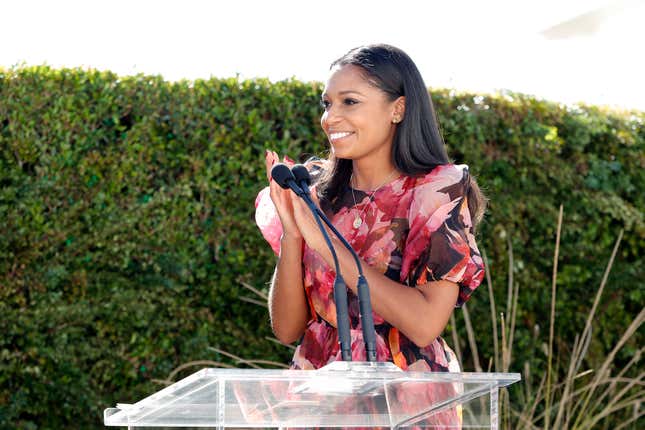
Jeanell English, one of the women who resigned from her position as Executive Vice President of Impact and Inclusion at the Academy of Motion Picture Arts and Sciences, is speaking out about her time ion the role and detailing her disheartening account about the obstacles she faced.
For context, back in July, we told you about the mass exodus of Black women in senior level DEI positions who either resigned or were let go from a handful of huge Hollywood companies such as Disney, Netflix, Warner Bros. Discovery, the Academy and more.
Now, one of those women, English, is being transparent about the “micro and macro-aggressions” she faced while in her role. Speaking about her experience in a candid column in the L.A. Times published on Tuesday, English also detailed how the “weight of progress” regularly positioned her in a place of fear and challenged her ability to effectively do her job to the best of her ability.
“In my role at the academy, I sat in the crossfire between the communities I was advocating for and those I was calling on to champion change. On both sides, there was fear,” she said. “Fear made it challenging for those who are underrepresented within the industry to trust that I had their best interest at heart. Given the history of the industry, there was skepticism. They needed to know that I not only heard their concerns but felt them. There were also people in positions of power who feared change, feared losing relevance, feared losing money… and feared being canceled.”
She continued:
Fear created an impasse. It fueled a scarcity mind-set, as opposed to one of abundance. It prevented artists, executives, advocates and allies from being able to sincerely listen to understand without becoming defensive. And it provoked resistance to collaboration and creative thinking, a stance that has slowed or halted shifts not only at the academy but across the entire industry. Prioritizing DEAI is not the zero-sum game it is often perceived to be.
As a result, I became the recipient of a steady flux of micro- and macro-aggressions. I anticipated and grew accustomed to being regularly challenged, publicly and privately. I felt the pressure of remaining thoughtful, poised and articulate while coaching, counseling and responding to the needs of my colleagues also from marginalized communities and nursing my own wounds.
The level of consensus-building needed to establish a foundation for the changes I encouraged demanded a level of mental agility and fortitude that was unsustainable. I, like many of my comrades in DEAI, acknowledge that feeling safe, valued and protected is fleeting in this work.
She went on to share that she was being given “less support and more demands,” thus making the work she set out to do much more challenging than before. She explained that those feelings were further exacerbated when a regular and direct line of communication between her and the CEO was cut off.
What’s also interesting to note is that she also felt somewhat slighted particularly when Black women’s contributions in the film space weren’t acknowledged at last year’s Oscars (this is likely in reference to the lack of inclusion of films like Till and The Woman King, both of which were met with widespread critical acclaim yet received no recognition at the 2022 Academy Awards).
And it’s because of all the aforementioned struggles, English ultimately decided to put herself, her mental and physical health, and her joy first and resign from her position.
“My exit from the academy was not an act of martyrdom. It was the only plausible decision after a liberating realization: “I will not sacrifice my life for the systems that do not see me,” she said. “Although I walked away exhausted, I left at peace feeling proud of what I accomplished, appreciative of the partners, allies and friends who enabled my successes and excited to invest my talents in different parts of the industry. I still do believe in solutions.”
To read English’s full column, head to latimes.com.

